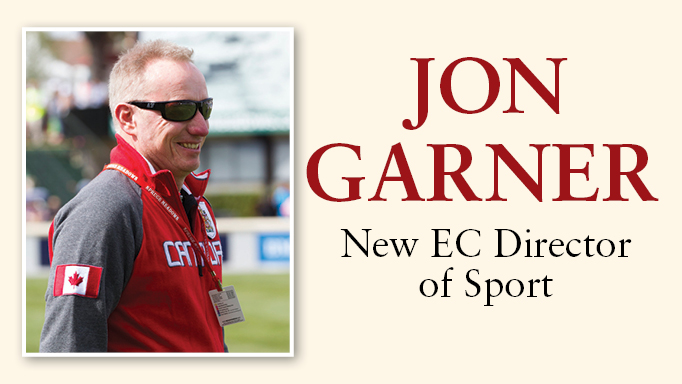Equestrian Canada (EC) announced on August 23rd that Jon Garner of Calgary, AB, was joining the national federation as its Director of Sport. Garner has a diverse background in equestrian sport an athlete, coach, and administrator. He began riding in Great Britain as a youngster and later served in the British Army in the King’s Troop Royal Horse Artillery. Garner moved to Canada in 1991 and was hired as professional rider at Spruce Meadows in 1998. By 2004, he had become the manager of competitions at that world-class venue, also providing colour commentary during global broadcasts.
In his new role, Garner will be responsible for:
• Leading the Equestrian Canada High Performance (HP) department;
• Working with key stakeholders to further develop and refine Canada’s HP system;
• Developing a HP major games strategy towards 2020/2024;
• Developing talent ID/development strategies with the technical discipline committees;
• overseeing preparation and logistics for the Canadian Equestrian Team at all major games.
Garner spoke with Horse Sport about his appointment:
Does Director of Sport replace the position of High Performance Director which Amie O’Shaughnessy left earlier this year, or is this a newly-created position?
It’s similar in some aspects; however I feel it is broader in scope. As the name ‘Sport’ implies, it is not just High Performance.
What do you see as the biggest challenge in your new role?
Getting to know everybody in all the disciplines! It’s a big country; it’s easy to get focussed in on the big three – the Olympic disciplines. But ultimately, it’s about what as a federation we can do for all of them. [EC] is evolving; one of the lines that came out of the convention from Ingmar [de Vos] was “change or be changed.” I think that’s prudent in any sport. If you don’t keep moving forward, you’re going to get left behind.
What particular skill set do you think will serve you best at Equestrian Canada?
I am passionate about horses and horse sport. I feel I am approachable and willing to listen, and having been in the trenches I hope the various stakeholders will feel I understand. I have tried my hand at most things on a horse and I have a pretty diverse background, so I hope that helps. The athletes want to be heard – they may know there is nothing you can do right now, but let’s see what we can look at moving forward. I understand from the rider’s level what they go through.
Can jumping reasonably expect to get OTP funding back thanks to Eric’s bronze and the 4th-place finish of the team?
I think it’s a possibility – I would say a probability – that we will be invited to present to OTP because of the results. From there, it is about showing OTP that jumping is a credible medal threat. They will look at the results based on the metrics that they have. It’s very cut-and-dried; they’re targeting more and more. Every sport is under the microscope. It is government funding, so when there are lots of other programs within the government portfolio screaming for money, you have to make a compelling case.
What needs to be done to bring Canada in line with the European super-powers again, especially in dressage, eventing, and para-dressage?
It is interesting how quickly the tables have turned, but where there is adversity there is opportunity. A sound program is critical to have sustainability; there will always be ups and downs, but in the end there must be a solid foundation. Otherwise it is too hit-and-miss. I do feel very strongly that in North America, the industry is what leads the sport, whereas in Europe the sport leads the industry. They are intrinsically different; we have a very vibrant horse industry in Canada, but there are times that it gets in the way of developing our athletes. It’s a bit of a cultural shift. The biggest one for me is coaching. Coaching is critical. Ireland did it – they completely revamped and now they have some of the best young riders and coaches in the world, because they have a sound coaching philosophy in progress.
Part of your new role will be to help in identifying and developing talent. What is that system currently lacking?
It’s a scattered approach, reliant on individuals breaking through by themselves. The No Boundaries program in eventing is a start, and I hope the U25 in jumping will help. But there needs to be programs, not just competitions.
What prompted you to leave Spruce Meadows after so many years with that organization?
It was a really hard decision, but I am excited about the direction Equestrian Canada is headed. There are great things ahead.

